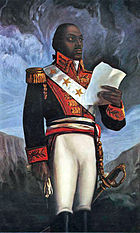George Boxley
| North American slave revolts |
|---|
 |
|
George Boxley (1780–1865) was a white abolitionist and former slaveholder who allegedly tried to coordinate a local slave rebellion on March 6, 1815, while living in Spotsylvania, Virginia. His plan was based on "heaven-sent" orders to free the slaves. He tried to recruit slaves from Orange, Spotsylvania, and Louisa counties to meet at his home with horses, guns, swords and clubs. He planned to attack and take over Fredericksburg and Richmond, Virginia. Lucy, a local slave, informed her owner, and the plot was foiled. Six slaves involved were imprisoned or executed. With his wife's help, Boxley escaped from the Spotsylvania County Jail and, despite a reward, he was never caught.
Boxley fled to Ohio and Indiana, where he was joined by his family. He built a cabin in 1830, the first in Adams Township. He helped runaway slaves, taught school, and supported abolitionism. The George Boxley Cabin has been listed on the National Register of Historic Places.
George Boxley, a native of Virginia, was born in 1780. He was a merchant storekeeper and miller who became deeply committed to abolitionism. He arrived in Indiana as a fugitive from justice and was the first settler in Adams Township, Hamilton County, Indiana. Accounts vary in details, but the facts are that Boxley, himself a slaveowner, opposed—or came to oppose—the institution of slavery. Boxley was accused of helping slaves to escape and of fomenting a slave rebellion in Spotsylvania County, Virginia. Jailed, he made his escape aided by his wife Hannah. After fleeing Virginia, Boxley may have spent a brief time in Pennsylvania.
Various accounts indicate that he lived in Ohio and the Missouri Territory at different times, and that at least once he was confronted by bounty hunters but was able to elude them. His family eventually joined him each time he relocated. Finally Boxley headed to Indiana, pausing first at Strawtown with the idea of continuing westward to settle along the Wabash River. Sources indicate that on his way west through the heavily forested land, Boxley took note of what was to become his future home and decided to stake a claim there.
...
Wikipedia
